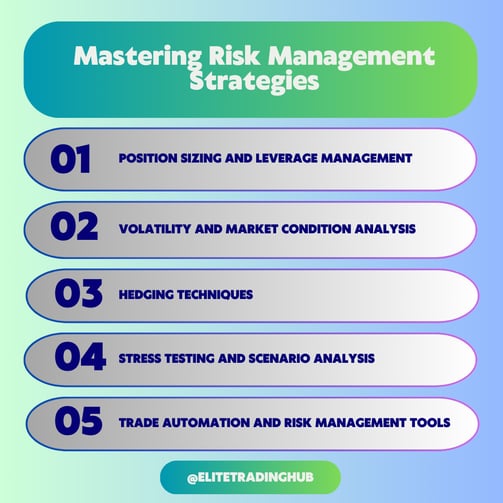The Role of Risk Management in Prop Firm Success 🚀
In the world of prop trading, where fortunes can be made and lost in the blink of an eye, the importance of effective risk management cannot be overstated. As a prop trader or aspiring prop firm, mastering the art of risk management is the key to long-term success and sustainability. In this comprehensive blog post, we'll dive deep into the crucial role of risk management in prop firm success. 🔍 We'll explore the various strategies and techniques that prop traders and firms can leverage to mitigate risk, maximize returns, and stay ahead of the competition.
The Foundations of Effective Risk Management 🏗️
Risk management is not just a buzzword in the prop trading industry - it's the backbone of any successful trading operation. At its core, risk management involves identifying, analyzing, and proactively addressing the potential risks that can impact your trading performance.
Some of the fundamental elements of effective risk management include:
Establishing Risk Tolerance Limits: Defining clear and realistic risk tolerance limits is crucial. This involves determining the maximum amount of risk you're willing to take on for a given trading strategy or position.
Diversification: Spreading your trading portfolio across multiple asset classes, markets, and strategies can help mitigate the impact of any single point of failure.
Stop-Loss Mechanisms: Implementing robust stop-loss orders and other protective measures can help you limit potential losses and preserve your trading capital.
Continuous Monitoring and Adaptation: Regularly monitoring your trading activities, market conditions, and risk exposure is essential. This allows you to quickly identify and address any emerging threats or opportunities.
Mastering Risk Management Strategies 🧠


Effective risk management in prop trading goes beyond just the foundational elements. Successful prop firms and traders leverage a range of advanced strategies to fine-tune their approach and stay ahead of the curve.
Some of the key risk management strategies that prop traders should consider include:
Position Sizing and Leverage Management: Carefully managing the size of your trading positions and the leverage you employ can have a significant impact on your overall risk exposure.
Volatility and Market Condition Analysis: Closely monitoring market volatility and adjusting your trading strategies accordingly can help you navigate turbulent market conditions.
Hedging Techniques: Utilizing hedging strategies, such as options contracts or futures, can help you offset the risks associated with your core trading positions.
Stress Testing and Scenario Analysis: Regularly conducting stress tests and analyzing various market scenarios can help you identify potential weaknesses in your trading approach and implement appropriate risk mitigation measures.
Trade Automation and Risk Management Tools: Leveraging advanced trading platforms and risk management software can provide you with real-time insights, automated risk monitoring, and data-driven decision-making support.
The Impact of Risk Management on Prop Firm Success 📈
Effective risk management is not just a theoretical concept - it has a direct and tangible impact on the success and longevity of prop trading firms. By prioritizing risk management, prop firms can achieve several key benefits:
Improved Trading Performance: By minimizing downside risk and preserving trading capital, prop firms can achieve more consistent and sustainable trading profits over the long term.
Enhanced Reputation and Credibility: Prop firms that demonstrate a strong commitment to risk management are often viewed as more trustworthy and reliable by both clients and industry peers.
Increased Investor Confidence: Robust risk management practices can help prop firms attract and retain a loyal investor base, as investors are more likely to entrust their capital to firms that prioritize risk mitigation.
Competitive Advantage: Prop firms that excel at risk management may gain a strategic edge over their competitors, as they are better equipped to navigate turbulent market conditions and seize opportunities.
Regulatory Compliance: In many jurisdictions, prop trading firms are subject to various regulatory requirements related to risk management. Adhering to these standards can help ensure compliance and avoid potential legal or financial penalties.
Conclusion: Embracing Risk Management for Sustainable Prop Firm Growth 🌟
In the high-stakes world of prop trading, risk management is not just a luxury - it's a necessity. By embracing a comprehensive and proactive approach to risk management, prop traders and firms can unlock a world of opportunities, protect their trading capital, and position themselves for long-term success.
Whether you're a seasoned prop trader or just starting your journey, mastering the art of risk management should be a top priority. By implementing the strategies and techniques outlined in this blog post, you can take your prop trading firm to new heights and solidify your position as a leader in the industry.
So, what are you waiting for? Start your journey towards prop trading success by embracing the power of risk management today! 💪
